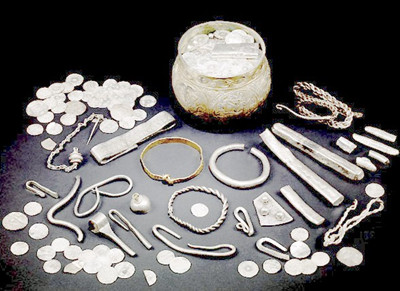And that's why all the later kings of the English, whether it was Normans or Plantagenets or Tudors, looked back to Athelstan as the founder of their kingdom.
因此之后的英格蘭國王,不管是諾曼王朝、金雀花王朝還是都鐸王朝,都奉阿瑟斯坦為王國的奠基人。
And in one sense you could say they go back to that moment in 927.
在某種意義上說,他們部追溯到了九二七年的那一刻。
But it was a pretty messy moment, and the hoard demonstrates that the struggle between Viking and Anglo-Saxon wasn't yet over.
但當時的形勢十分混亂,這批寶藏表明維京人和盎格魯-撒克遜人的爭斗遠未結束。
The treasure certainly belonged to a rich and powerful Viking, but he must have stayed on in Yorkshire under the new regime, because some of the coins in his hoard were minted by Athelstan in York in 927.
它們的主人必定是位有錢有勢的維京人,在盎格魯-撒克遜接管約克之后,他仍然居住于此,因為寶藏中有一些阿瑟斯坦于927年發行的銀幣。
Something must then have gone wrong for our Viking, which led him to bury the hoard-but he did it so carefully that he must have intended to return.
他一定是厄運臨頭,因此不得不把財寶埋藏起來,且埋得相當謹慎,想必幻想著日后回來挖掘。
Was he killed in the ongoing skirmish between Vikings and Anglo-Saxons?
他是否在維京人和盎格魯-撒克遜人持續不斷的紛爭中被殺?
Did he go back to Scandinavia, or on to Ireland?
他有沒有回到斯堪的納維亞,還是去了愛爾蘭?
Whatever happened to the treasure-owner, most of the Vikings in England stayed on and, in due course, were assimilated.
不管藏寶人的命運如何,留在英格蘭的維京人多數被日漸同化。
In north-east England today, places with names ending in by and thorpe-like Grimsby and Cleethorpes-are living survivals that still speak of the long Viking presence.
如今在英格蘭東北部,以“by”和“thorpe結尾的地名,如 Grimsby和Cleethorpes,便是維京人曾漫長存在的生動殘余。
譯文屬可可原創,僅供學習交流使用,未經許可請勿轉載











